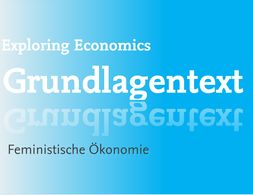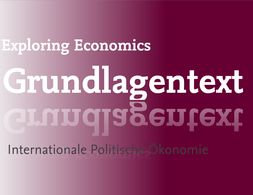628 Ergebnisse
In this essay the authors argue for a wider concept of care work that includes community building, civic engagement and environmental activism. On the basis of the case of Cargonomia, a grassroot initiative in Budapest, they show that such a wider concept of care work could allow for different narratives that promote sustainable lifestyles with a milder environmental and social impact on the planet and its communities.
This text provides an easy to understand introduction to complexity economics for non-specialist audiences such as bachelor's students.
This course is designed to provide students with an understanding of work-related gender issues and to enable students to analyze the issues using the tools of economics.
Bei der feministischen Ökonomie geht es darum, den unbezahlten Teil der Ökonomie sichtbar zu machen und die Geschlechterblindheit von ökonomischen Prozessen aufzudecken. Entstanden ist diese Theorierichtung in den 1960er Jahren, wobei die Wurzeln bis ins 19 Jahrhundert zurück reichen. Zu Beginn setzten sich die Feministen und Feministinnen vor allem für das Erreichen des Frauenwahlrechtes, für den Zugang zur Bildung und der Abschaffung der Vernunftehe ein. Die Gleichberechtigung von Mann und Frau war in der zweiten Welle des Feminismus zu finden. Bis heute gibt es zwischen Männern und Frauen Unterschiede, welche durch den Feminismus versucht werden aufzudecken und zu beseitigen. Zum Beispiel die Care-Arbeit, den Gender-Wage-Gap, keine Berücksichtigung in ökonomischen Modellen, etc.
Have you ever thought about the role of civil society and the evolution of economy in one breath? This one hour long interview of Daron Acemoğlu (MIT) and Martin Wolf (Financial Times) by Rethinking Economy NL gives you much inspiration for it.
This is a new online course at bachelor level. It presents an introduction into macroeconomics with a specific focus on the euro area. The theoretical part provides a critical presentation of the two key macroeconomic models: the (neo)classical approach and the Keynesian approach. This allows a comparative analysis of important macroeconomic topics:
unemployment
inflation
government debt and Modern Monetary Theory
banks and financial crises.
The policy-oriented part discusses the monetary policy of the ECB and the specific challenges for fiscal policy in the euro area. The course also presents other euro area specific topics: Optimum currency area, euro crises, Next Generation EU and Green New Deal.
The Philosophy of Economics Foundational Text provides a systematic and well-structured overview over the field of philosophy of economics.
Dependency in Central and Eastern Europe - Self-reliance and the need to move beyond economic growth
In this essay, the author takes a critical perspective on the pursuit of growth as the solution for providing for environmental sustainability and economic stability in the countries of Central and Eastern Europe.
Drawing from the framework of dependency theory and presenting brief insights into European core-periphery relations the author then argues for the implementation of an alternative strategy to development that is built around the concept of self-reliance.
Stratification economics is defined as a systemic and empirically grounded approach to addressing intergroup inequality. Stratification economics integrates economics, sociology and social psychology to distinctively analyze inequality across groups that are socially differentiated, be it by race, ethnicity, gender, caste, sexuality, religion or any other social differentiation.
Marxian Political Economy focuses on the exploitation of labour by capital. The economy is not conceived as consisting of neutral transactions for exchange and cooperation, but instead as having developed historically out of asymmetric distributions of power, ideology and social conflicts.
Complexity economics focuses on interactions and interdependencies between individuals and structures in economic systems. Those are systems of organised complexity. High importance is given to the analysis of networks.
Der Fokus der Komplexitätsökonomik liegt auf den Interaktionen und Wechselwirkungen zwischen Individuen und Strukturen wirtschaftlicher Systeme. Diese werden als Systeme organisierter Komplexität aufgefasst. Ein besonderes Augenmerk liegt auf der Analyse von Netzwerken.
Behavioural economics deals with observing behaviour and economic decision making behaviour.
From the two premises that (1) economies are complex systems and (2) the accumulation of knowledge about reality is desirable, I derive the conclusion that pluralism with regard to economic research programs is a more viable position to hold than monism. To substantiate this claim an epistemological framework of how scholars study their objects of inquiry and relate their models to reality is discussed. Furthermore, it is argued that given the current institutions of our scientific system, economics self-organizes towards a state of scientific unity. Since such a state is epistemologically inferior to a state of plurality, critical intervention is desirable.
One method of economic modelling that has become increasingly popular in academia, government and the private sector is Agent Based Models, or ABM. These simulate the actions and interactions of thousands or even millions of people to try to understand the economy – for this reason ABM was once described to me as being “like Sim City without the graphics”. One advantage of ABM is that it is flexible, since you can choose how many agents there are (an agent just means some kind of 'economic decision maker' like a firm, consumer, worker or government); how they behave (do they use complicated or simple rules to make decisions?); as well as the environment they act in, then just run the simulation and see what happens as they interact over time.
As opposed to the conventional over-simplified assumption of self-interested individuals, strong evidence points towards the presence of heterogeneous other-regarding preferences in agents. Incorporating social preferences – specifically, trust and reciprocity - and recognizing the non-constancy of these preferences across individuals can help models better represent the reality.
Representing everyone An Analysis of the Representation of Migrant Women by official Labour Organizations in Germany Author Tess Herrmann Review Deborah Sielert This is an essay of the writing workshop Gender and the Economy Perspektives of Feminist Economics published on 17 May 2017 updated on 16 August 2017 Why we …
Approaching the law of nature that determines all forms of economy. The bulk of economic theory addresses the economic process by setting out on a catalogue of aspects, seeking the laws in the aspects and hoping to get together a reliable view of the whole.
In the history of the social sciences, few individuals have exerted as much influence as has Jeremy Bentham. His attempt to become “the Newton of morals” has left a marked impression upon the methodology and form of analysis that social sciences like economics and political science have chosen as modus operandi.
This module examines current socio-political issues through the lens of pluralism, that is pluralism of theory, pluralism of method and interdisciplinary pluralism
Michael Kalecki famously remarked “I have found out what economics is; it is the science of confusing stocks with flows”. Stock-Flow Consistent (SFC) models were developed precisely to address this kind of confusion. The basic intuition of SFC models is that the economy is built up as a set of intersecting balance sheets, where transactions between entities are called flows and the value of the assets/liabilities they hold are called stocks. Wages are a flow; bank deposits are a stock, and confusing the two directly is a category error. In this edition of the pluralist showcase I will first describe the logic of SFC models – which is worth exploring in depth – before discussing empirical calibration and applications of the models. Warning that there is a little more maths in this post than usual (i.e. some), but you should be able to skip those parts and still easily get the picture.
After completing the module, participants should be able to have general overview on the theory of commons. They can differentiate between neoclassical, new institutional and social/critical commons theory and can use these theories to assess real life common-pool resource management and commoning pratices.
The goal of this course is to explore these differences in economic outcomes observed among women and men, measured by such things as earnings, income, hours of work, poverty, and the allocation of resources within the household. It will evaluate women’s perspectives and experiences in the United States and around the world, emphasizing feminist economics.
Markets are the focus in modern economics: when they work, when they don’t and what we can or can’t do about it. There are many ways to study markets and how we do so will inevitably affect our conclusions about them, including policy recommendations which can influence governments and other major organisations. Pluralism can be a vital corrective to enacting real policies based on only one perspective and a plethora of approaches provide alternatives to the canonical view. Although they have differing implications, these approaches share the idea that we should take a historical approach, analysing markets on a case-by-case basis; and they share a faith in the power of both individuals and collectives to overcome the problems encountered when organising economic activity.
Diese Webseite widmet sich der Vielfalt bestehender ökonomischer Theorien und Methoden. Orientiere Dich, vergleiche, entdecke und studiere die unterschiedlichen ökonomischen Perspektiven.
Due to the IMF’s focus on gender budgeting, this essay will mainly examine its gender budgeting recommendations as an example of its general inclination towards gender issues and its conception of gender equality. What does the IMF’s focus on gender equality really mean from a critical feminist perspective? What are its main objectives? What does it seek to change and to maintain? What concept or idea of women does it follow and what are the underlying theoretical foundations?
Financial Evolution at the Speed of Thought A new evolutionary explanation of markets and investor behaviorHalf of all Americans have money in the stock market yet economists can t agree on whether investors and markets are rational and efficient as modern financial theory assumes or irrational and inefficient as behavioral …
Exploring Economics, an open-source e-learning platform, giving you the opportunity to discover & study a variety of economic theories, topics, and methods.
This essay focuses on the sources of government revenue within the Middle East and North African (MENA) region and proposes the implementation of a regional tax reset through increased taxation and tax reforms, deregulation in the private sector and economic diversification to reduce macroeconomic volatilities caused by the hydrocarbon industry.
In diesem Text aus der Reihe "Exploring Economics - Foundations" werden die Grundlagen der Internationalen Politischen Ökonomie als interdisziplinäre wissenschaftliche Strömung dargestellt.
Firms are the primary places where economic activity takes place in modern capitalist economies: they are where most stuff is produced; where many of us spend 40 hours a week; and where big decisions are made about how to allocate resources. Establishing how they work is hugely important because it helps us to understand patterns of production and consumption, including how firms will react to changes in economic conditions and policy. And a well-established literature – led by post-Keynesians and institutionalists – holds that the best way to determine how firms work is to…wait for it...ask firms how they work. This a clearly sensible proposition that is contested in economics for some reason, but we’ll ignore the controversy here and just explore the theory that springs from this approach.
Mainstream inflation theories in economics do little to explain the recent acceleration in price increases. The associated economic policy recommendations further increase the misery of low-income groups.
Wir nutzen Cookies. Klicke auf "Akzeptieren" um uns dabei zu helfen, Exploring Economics immer besser zu machen!




























